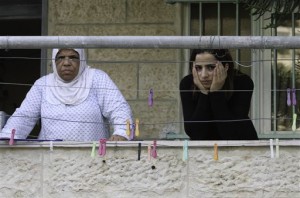Takeovers of Arab apartments in east Jerusalem spark anger

In this photo taken Tuesday, Sept. 30, 2014, two Palestinian women stand at their balcony over looking the entrance of the neighboring house that belongs to Palestinian Ziad Qarain, which Jewish settlers moved into, at the Palestinian neighborhood of Silwan, East Jerusalem. AP
JERUSALEM (AP) — They moved under the cover of darkness, slipping into apartments in this east Jerusalem neighborhood in the middle of the night and changing the locks.
When the sun rose Tuesday, Arab residents of Silwan found Israeli security guards and young male volunteers hunkered down inside 25 apartment units in their impoverished neighborhood and an adjacent area — the biggest settler takeover since Jews began buying up properties in the volatile area two decades ago.
The organization that oversees Jewish settlement here calls them legal purchases in a hostile neighborhood, while Arabs and the international community see it as a nationalistic conquest in land Israel captured in 1967. And the practice has sparked yet another spat between Israel and the U.S., months after recent Mideast peace efforts once again failed.
White House spokesman Josh Earnest condemned the occupation of the properties “by individuals who are associated with an organization whose agenda, by definition, stokes tensions between Israelis and Palestinians.”
That organization, the Elad Foundation, says it has settled hundreds of Jews amid an Arab population estimated at about 30,000 in an area it calls the City of David, where Jewish tradition holds King David established Jerusalem as Judaism’s central holy city.
Article continues after this advertisementThe Palestinians claim east Jerusalem, home to the city’s most sensitive holy sites, as the capital of a future independent state. Israel vows all of Jerusalem will forever be Israel’s capital. But the international community, including the U.S., does not recognize Israel’s annexation of east Jerusalem and says the area’s fate must be resolved through negotiations.
Article continues after this advertisementIsraeli officials have rebuffed the criticism, insisting that Arabs and Jews of the city are free to buy properties wherever they want.
“Definitely Jews can buy apartments wherever they want in Jerusalem, and especially in the City of David, which is the place of ancient Jerusalem 3,000 years ago,” Jerusalem Mayor Nir Barkat told Israeli Channel 2.
Jerusalem’s Arabs, while free to live wherever they want, say they often encounter resistance or discrimination when trying to buy or rent properties in Jewish areas.
Speaking to U.S. cable network MSNBC, Prime Minister Benjamin Netanyahu said the White House statement deploring the Silwan move was “baffling” to him.
“It criticized individual Jews who bought apartments in an Arab neighborhood,” Netanyahu said. “Jews buy apartments, private property, in Arab neighborhoods. Arabs buy apartments in Jewish neighborhoods.”
The properties in question, however, were not purchased by individuals.
Kendall Finance, a private American real estate investment company, paid millions of dollars for six buildings consisting of 25 property units from various Palestinian homeowners, said Doron Spielman, vice president of Elad, which according to Spielman served as a consultant to the purchases.
Avi Segal, a Jerusalem-based lawyer for Kendall Finance, said the properties were in the City of David and nearby Mount Zion areas. He said the company owns the properties and will lease them to residents.
“Kendall Finance consulted with many advisors in doing due diligence for this transaction, among them being the Elad Foundation, who has a general level of expertise in the area,” Segal said in an email.
Segal declined to say where in the U.S. that Kendall Finance is based.
Jewish real estate deals in the contentious Silwan area have long been murky. Purchases often go through intermediaries, which those involved says protects the Arab sellers from being attacked by their neighbors. In some cases, Arabs who say they are the rightful homeowners take Elad to court, arguing the properties were sold by imposters posing as homeowners.
Residents move in at night while Arab neighbors are asleep. The Israeli government bankrolls armed security guards to protect the Jewish residences, many of which are equipped with blooming geranium bushes, Israeli flags and security cameras.
Elad long has attracted controversy because of its nationalistic agenda. But Elad says the area is central to Jewish heritage, and investment in the area has benefited Arab and Jewish residents alike.
“We would like to see the majority of Jews living in this area,” Spielman said. “Having said that, we respect our Arab neighbors.”
About 500 Jews live in the area, and the newly purchased homes will allow for 200 more, Spielman said.
Until residents move in, the properties are occupied by police officers, private security guards, and young volunteers packing pistols. An ad on a Facebook page for religious Jewish army veterans offered 500 shekels ($140) a day to anyone willing to sit in the properties.
On Thursday, Israeli police officers disappeared down a narrow concrete alleyway, bringing a box of supplies deep into the Arab neighborhood to a second-floor apartment. The Israelis peered out from windows they enveloped in wire mesh, and would not open the door to visitors.
In a narrow alleyway below, an exasperated Palestinian woman, 23-year-old Bushra Mohammed Adel Khayyatt, said her laptop and jewelry were stuck inside the apartment, and that her knocks on the door and pleas to get her belongings back have gone unanswered. She insisted her family had not sold the apartment.
A group of young Palestinian residents gathered and screamed at her, accusing her family of selling their home to the new residents.
“Are you crazy?” she retorted. “How would my father sell to Jews?”
RELATED STORIES
Rights watchdog urges Israel to extend settlement freeze